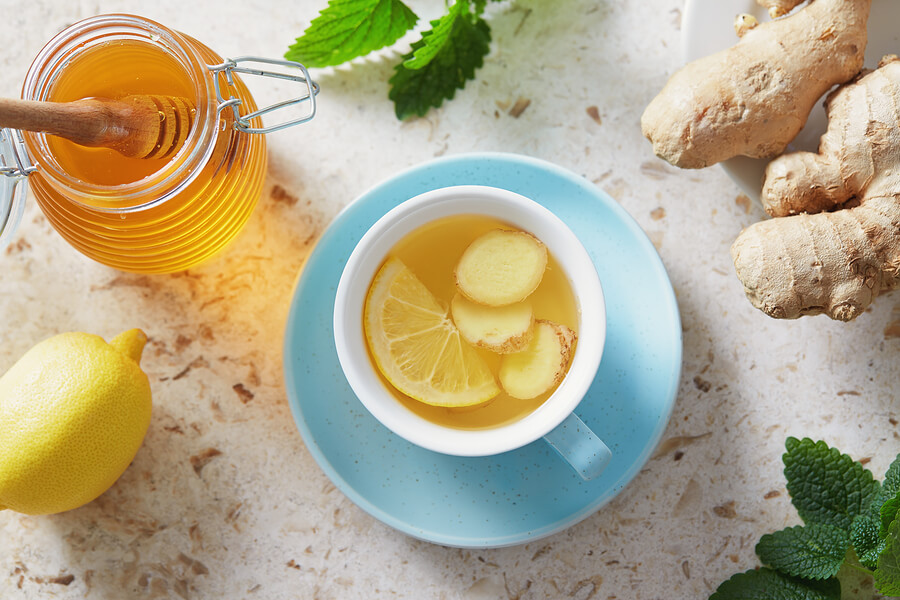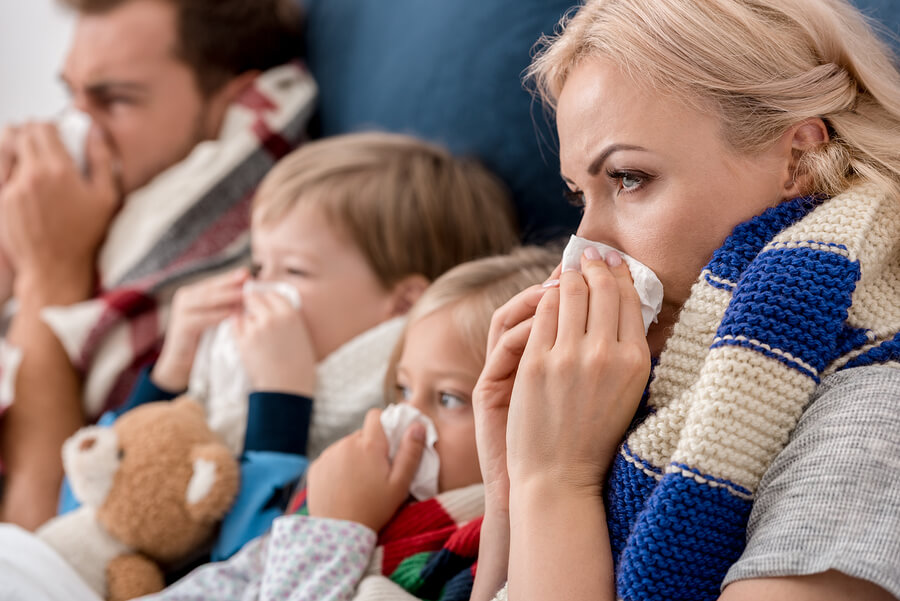Flu and Cold Remedies You Must Try Today!
The winter months bring colder weather, less daylight and the worst season of the year – cold season. If you’re lucky, you’ll be spared the gift that keeps on giving. If you’re not so lucky, keep reading for ways to quickly soothe your symptoms.
The terms “cold” and “flu” are often used interchangeably, so you might be surprised to know they aren’t the same thing. While the symptoms present themselves in similar ways, the flu is more severe and can have serious consequences if left untreated.
The possible complications of the flu are pneumonia and bacterial infections resulting in long-term hospitalization. The best way to avoid complications is to seek treatment as soon as you think you have the flu. The earlier, the better.
Differences Between Colds and The Flu
Influenza (the flu) and a cold are both upper respiratory illnesses caused by viral infections. However, they are caused by two different viruses. The flu is caused by the influenza virus and most colds are caused by the rhinovirus (which has nothing to do with rhinoceroses!)
Both viral infections are transmitted through the air and contaminated surfaces. This is why it is important to wash your hands frequently and practice good personal hygiene. Good personal hygiene can include covering your mouth when you cough, sneezing into your elbow and staying home from work or school when you are sick.
Children should also be kept home from school, so they get the rest they need and don't pass the illness along. Kids love to share!

What Are the Symptoms of Colds and The Flu?
The first symptom that appears in both the common cold and the flu is a cough with chest discomfort (also, congestion.) Other symptoms both infections share are:
- Sore throat
- Fatigue
- Stuffy nose
- Sneezing
- Runny nose
- Aches and pains
One significant difference between a cold and the flu that is used as a diagnostic tool is that the flu symptoms appear quite suddenly and the onset of cold symptoms is gradual. With a cold, you tend to feel run-down for days or weeks before you realize that you might be sick.
Fever, chills and headaches are all symptoms that are more often related to the flu than to a simple cold. It’s not impossible to have these symptoms with a cold, but it isn’t particularly common. Influenza is diagnosed by rapid response tests that can have the results in as little as 10-20 minutes.
There isn’t a test for diagnosing a cold. If your flu test comes back negative, the process of elimination will tell you that you have a cold.

How to Cure the Flu Quickly
There is no way to ‘cure’ the flu – quickly or otherwise. There are ways to help your body speed up the process of expelling the virus, but first, here are a few tips on how to ease the symptoms of a cold or the flu immediately:
Rest
Not that you have the energy to do anything else, but rest is the absolute best way for your body to fight an infection. Whether it is a cold, the flu or really any infection or injury
Humidifier
Keeping a humidifier running in your room or taking a steam bath is a surefire way to clear out clogged nasal canals
Feed a cold with fluids
Whether it is water, soup or healing teas, fluids provide your body with the fortification that it needs to fight off an illness
Did we mention rest?
Because it’s REALLY important
As we’ve already mentioned, there aren’t any known cures for the flu or a cold. However, there are a few different options that will decrease the severity of the viral infection and promote healing.
The three methods of fighting a cold are over-the-counter medications, prescribed antiviral medicines and all-natural remedies. Let’s break them down a bit:

Over-the-Counter (OTC) Medicines
There are a large variety of over-the-counter medicine types.
What does that mean for you?
Read the box to see which symptoms they are used for and brands that manufacture the medicine. Some brands may have subtle differences, but most will have similar dosage.
Here are 4 of the most common types of flu-fighting OTC medicines.
Decongestants
Decongestants are used to combat the chest congestion caused by excessive phlegm and mucus. The chest congestion can make breathing painful and cause you to cough up an unpleasant discharge.
Sudafed and Mucinex are two of the most well-known brands of decongestants.
Antihistamines
Antihistamines are typically used to fight allergies, but they can also relieve the symptoms of sneezing and watery eyes associated with cold and the flu.
Two of the best antihistamines are Benadryl and Dimetapp
Cough Syrups
Cough syrups help ease the sore, scratchy feeling caused by frequent coughing.
The best part?
Nighttime varieties may have added sedatives, helping you get some much needed rest. Win/win!
Lozenges
Lozenges is a fancy way of saying cough drops. These help ease sore throat symptoms and stops coughing… without putting you to sleep. They also come in a variety of flavors, such as cherry and lemon.
Halls Cough Drops are probably the most recognizable. There are even organic brands that base their formula around natural ingredients like honey.
Antiviral Medicines
Antiviral medicines need to be prescribed by your doctor and taken within 48 hours of the onset of symptoms. They can help prevent further flu complications or even shorten the duration of the flu. Some common brands of antiviral medicines are Rapivab, Relenza and Tamiflu.
Many people ask their doctors to prescribe antibiotics to fight the flu. While antibiotics are helpful in curing a variety of infections, they only work for bacterial infections.
The flu and colds are viral infections, not bacterial infections.
All-Natural Remedies
Many people are turning more and more toward all-natural remedies for a number of illnesses and diseases.
There are many benefits to choosing all-natural methods of healing over pharmaceutical methods. These advantages include:
- More affordable than conventional medicine
- Utilizes the body's natural healing process
- Strengthens the immune system
- Fewer side effects and negative reactions
- Easier to obtain than prescriptions, which often require a costly doctor's visit
All-natural medicine has grown into such a mainstream phenomenon that it deserves its own section.

How Can I Fight the Flu Naturally?
You may prefer to sidestep modern medicine and get back to our roots by seeking natural flu and cold remedies.
Here are 7 all-natural suggestions for fighting colds and the flu:
Gargle with salt water
Salt water helps reduce swelling in your throat caused by the constant irritation of coughing.
Put honey in your tea
Honey has been proven to be a cough suppressant and it will soothe your sore throat.
Take a shot of ginger
Ginger is known to effective in breaking up mucus, which eases your congested chest.
Put garlic in your food
Garlic has antioxidant properties that are useful in fighting viruses.

Eat bone broth or chicken soup
Bone broth and chicken soup provide your body with much-needed nourishment.
Take a bath in epsom salt
Epsom salt detoxifies your body and helps you relax.
SLEEP
Sleep gives your body a chance to recharge.
Do-It-Yourself Cold & Flu Remedy Recipes
Many people swear by a mixture of lemon, honey and ginger.
The Herbal Academy offers great recipes for all sorts of ailments, including this awesome recipe for Ginger Lemonade.
Don't knock it til you've tried it!

Garlic Lemonade
- 2-4 chopped garlic cloves
- 3-4 slices fresh ginger
- Raw honey
- Water
- 2-3 lemons
- In a 1 quart mason jar, combine 2-4 cloves chopped garlic and 3-4 slices of fresh ginger.
- Cover and let steep for at least 20 minutes.
- Add juice of 2-3 lemons and honey to taste (approximately ¼ cup)
- You can strain or leave herbs in mixture.
- Consume warm and as needed. It can be consumed at room temperature, but not chilled
Want your own natural cough syrup? Skip the trip to the store and brew your own at home!
Honey-Thyme Cough Syrup
Gather the following:
- 2 cups water
- 3 Tablespoons organic thyme (can be dried or fresh)
- 1 cup organic raw honey
Directions
- Boil the water and remove from heat.
- Stir in thyme and let steep, covered for about 10 mins.
- Strain the mixture into a resealable container (preferably glass)
- Add honey, stirring until well combined.
Keep refrigerated (lasts 2 months)
Take 1-2 teaspoons as needed and feel better soon!

Does Being Cold Cause a Cold?
“Don't go outside with wet hair!”
“Take an extra jacket with you!”
Children all over have been admonished to wear a hat so they don’t catch a cold.
Wondering if it's actually true?
We're here to tell you…
This is just an old wives’ tale – or more aptly, an old mothers’ tale — that has been passed down through the generations.
Dressing appropriately for the weather conditions is important or you’ll… be cold.
The flu and the common cold are viral infections that float through the air from person to person. It is transferred due to close quarters or poor personal hygiene. We're looking at you, dude who doesn't cover while sneezing!

Viral Infections – The Lottery You Don’t Want to Win
Getting the flu or cold viruses is sometimes like gambling in a casino. Whether you get it is predetermined before you even pull the lever. You can’t control the personal habits of other people, but you can control your own to help minimize your chances of getting sick.
Many doctors and the Center of Disease Control recommend getting the flu shot to prevent being susceptible to the flu. That is a personal decision for every individual to make for themselves and their families.
Having a cold or the flu can really affect your health and is never fun. The symptoms are invisible, meaning there is no way to tell which of your co-workers, friends or strangers on the street are infected. Someone could be passing it on to you at any moment.
Even if you practice diligent hand-washing and sanitation methods, there is always a chance you can get a viral infection through the air. We hope that with our tips, hopefully you’ll be prepared to fight it off.
Do you usually reach for natural remedies or prefer over-the-counter methods? Let us know in the comments below!
Feel free to share any of your personal flu & cold remedies!




Comments
Loading…